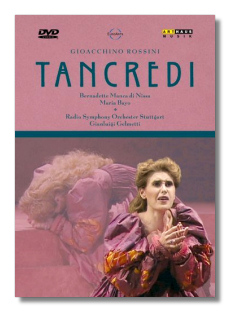
The Internet's Premier Classical Music Source
Related Links
- Rossini Reviews
- Latest Reviews
- More Reviews
-
By Composer
-
Collections
DVD & Blu-ray
Books
Concert Reviews
Articles/Interviews
Software
Audio
Search Amazon
Recommended Links
Site News
 DVD Review
DVD Review
Gioachino Rossini

Tancredi
- Bernadette Manca di Nissa (Tancredi)
- Maria Bayo (Amenaide)
- Raul Gimenez (Argirio)
- Ildebrando D'Arcangelo (Orbazzano)
- Katarzyna Bak (Isaura)
- Maria Pia Piscitelli (Roggiero)
Chorus of the Südfunk, Stuttgart
Radio Symphony Orchestra Stuttgart/Gianluigi Gelmetti
Arthaus Musik DVD 100207 166mins LPCM Stereo Full Screen
First staged in 1813, this was one of Rossini's earliest operas – he was not even 21 at the time of the première. Mozart had been dead for just 22 years, and there's much in Tancredi that looks backward as well as forward. In fact, there are pages in Tancredi that are positively Mozartean.
Based on Voltaire's tragedy, this is a story of innocence wronged, set against a backdrop of Turks at war with Syracuse. Amenaide, the daughter of Argirio, leader of the senate, is in love with the exiled knight Tancredi. Argirio offers Amenaide's hand in marriage to Orbazzano, the leader of a rival faction, as a token of reconciliation. Amenaide resists this, and sends a letter to Tancredi, who has returned to Syracuse and is in hiding. The letter is intercepted, and it is mistaken as an invitation to the Turk Solamir to enter Syracuse. All are appalled, even the disguised Tancredi. Amenaide is sentenced to death for treachery, but Argirio allows a champion to fight for her vindication. Although still believing her guilty, Tancredi (still disguised) does so. He bests Orbazzano, saves Amenaide, and sadly prepares to leave Syracuse for good. The Turks, however, are threatening to invade, and so Tancredi defends the city. He is victorious but mortally wounded. As death approaches, the truth about Amenaide's letter is revealed, and relieved, he marries her with his dying breath. This ending was consistent with Voltaire, but Rossini also wrote a happier ending in which Amenaide and an apparently uninjured Tancredi are reunited, and all is forgiven. This performance, recorded live at the Schwetzinger Festspiele in 1992, uses the original ending. After the curtain calls, however, the revised ending is performed as a kind of living appendix, thus giving the audience the opportunity to go home feeling elated, not depressed.
No complaints about the singing. Bayo projects Amenaide's innocence with mile after mile of bright and finely pointed tone. If she never really comes across as a tragic heroine, blame it partly on Rossini, who assumed that performers would provide his music with the necessary affect. In the title role, Manca di Nissa does not erase memories of Marilyn Horne (nor, more recently, of Eva Podles), but her approach to Rossini's text, like Bayo's, is punctilious, and the voice itself is impressive. Gimenez excels in the bel canto repertoire, and as Argirio, his heroically pinging tone makes him an able statesman and a surprisingly effective father. D'Arcangelo sounds good and looks great in the thankless role of Orbezzano. Isauro, an archetypal "soprano's best friend" role, nevertheless gets her moment in the sun, and Bak makes the most of it. Although his tempos are fine, Gelmetti could be a little more dynamic.
The production by Pier Luigi Pizzi is static. Even the attempts to give singers something meaningful to do during their arias feel labored. The chorus moves from one place to another as if they were players in a very large game of Risk. I got the impression that Pizzi was trying to recapture the feel of the première performance in Venice. One can take authenticity only so far, however, and it would have been better if Pizzi had not distanced himself from the material so much. The unattractive costumes (neck and wrist ruffs of blue or orange?) don't help, nor do the backdrops, which roll up and down with self-satisfied artifice.
The sound (PCM stereo) and image (4:3) are good, but not outstanding. (One can see video artifacts in the darker scenes.) The subtitles have been done well.
In sum, this is a good Tancredi – the only one on DVD – but it is better to hear than to look at.
Copyright © 2005, Raymond Tuttle




















